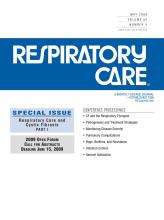Abstract
Since the detection of the underlying gene defect, our knowledge of how the genetic mutations in cystic fibrosis cause lung disease has increased substantially, but we still lack a complete understanding of some of the pieces in the puzzle. Nevertheless, the information gained has led to new therapeutic approaches that address key factors of cystic fibrosis pathophysiology. Past therapeutic successes were largely based on targeting the consequences of the cystic fibrosis transmembrane regulator dysfunction, such as phlegm retention, infection, and inflammation, but new therapies may be able to address the underlying abnormality rather than its downstream effects. The efficacy of these treatments still needs to be established, but early studies look promising for several compounds. This review summarizes our current understanding of the pathophysiology and treatment of cystic fibrosis lung disease.
- cystic fibrosis
- airway surface liquid
- cystic fibrosis transmembrane regulator
- CFTR
- pharmacotherapy
- chloride secretion
- gene therapy
- osmotic therapy
Footnotes
- Dr Ratjen presented a version of this paper at the 43rd Respiratory Care Journal Conference, “Respiratory Care and Cystic Fibrosis,” held September 26-28, 2008, in Scottsdale, Arizona.
- Copyright © 2009 by Daedalus Enterprises Inc.







